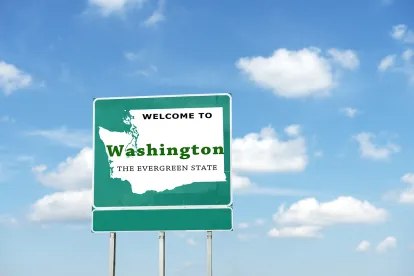The Washington state Department of Revenue (WDOR) in July 2022 published detailed guidance on the sales tax consequences of non-fungible token (NFT) sales, the first such guidance in the United States, and other state tax agencies may be eyeing how they too may capture NFT sales tax. Washington’s sales tax law already covers the sale of digital goods, such as video and music recordings, so WDOR may extend sales tax to NFTs that can be viewed or heard. Given that other states also tax digital product sales, Washington’s statement might become a guide to taxing the new universe of NFTs.
The big question is how WDOR would source the sales – meaning which jurisdiction’s sales tax would be applicable. The guidance points to the state’s existing sourcing rules for the sale of digital goods, which follow the below order:
- First, if the customer receives the digital goods at the seller’s business location, then the sale would be sourced to the business location;
- Second, to the location where receipt by the purchaser occurs;
- Third, if the first two sourcing rules are not applicable, then to the location indicated by an address of the customer available from the business records of the seller, when the use of such address does not constitute bad faith;
- Fourth, if the first three rules are not applicable, then to the location of the customer obtained during the consummation of the sale, including the address of the customer’s payment instrument (such as credit card billing address); or,
- Finally, if none of the above rules are applicable, then the location of the sale will be determined by the address from which the digital code was first available for transmission by the seller, or from which a digital automated service was provided (but disregarding any location that merely provides the digital transfer of the product).
The examples given do not address a situation where the seller does not know its customer’s location; however, the implication appears to be that if the seller does not take steps to determine the location of the customer, the location of the sale for Washington sales tax purposes would likely be deemed the location of the seller’s server. In such a case, if the seller’s server is located in the state of Washington, the state’s sales tax would be due on NFT sales unless the seller could prove it knew the customer was located in a different state. Therefore, a Washington-based NFT seller may wish to take steps to document the location of its customer to avoid having to charge Washington sales tax – although such a step might obligate the seller to collect sales tax in the customer’s state if that state also taxes digital goods. Obtaining the customer’s location might not be practical under current industry practices, but these sales tax rules may force such industry practices to change and lift the veil of anonymity currently shrouding NFT sales.
Although this guidance applies only to Washington, most states that tax digital product sales have similar sourcing rules, and there is a chance other states will copy this Washington guidance. Consequently, NFT sellers may wish to take steps to document their customer’s location to determine whether sales tax should be charged, based on the customer’s location, keeping in mind that knowing the customer’s location might obligate the NFT seller to collect the sales tax if the customer’s state taxes digital products.
These rules would be applicable to third-party marketplace facilitator sites that sell NFTs on behalf of others – such as OpenSea. Such third-party sites (rather than the seller) would be required to collect the sales tax, but some states might go after the seller as a party to the transaction if the marketplace facilitator fails to collect the tax. This depends on the state’s marketplace facilitator rule.
NFT sellers based in a state that taxes digital products should be wary of merely locating their server in a state that does not tax digital products, in the hopes that if they do not know the location of their customer, then they would be free of any obligation to collect the tax. Such a step might be challenged as a sham by the seller’s state tax agency, or the tax agency might argue that the location of the digital code is the seller’s “commercial domicile” (essentially its headquarters), which is the place used to determine the location of intangible property for state income tax purposes. Likewise, NFT sellers should be discouraged from asking for their customer’s location but stating that customers located in certain states would be required to pay sales tax. Such “coaching” of a customer to tell them they are located in a state that does not tax digital products might be viewed by a state tax agency as a clear tax avoidance measure, and shift to the default of the location from where the digital code was sent.
In addition to sales tax, NFT sellers should be aware that sales to customers in another state might subject them to income tax (or similar type taxes). The Washington guidance states that NFT sellers would be subject to the state’s gross receipts tax (called the business and occupation tax). Washington and several other states require companies with a certain threshold of sales to customers in the state to file state income tax returns there. Although there is a federal preemption – called P.L. 86-272 – that does not allow a state to impose its income tax on a company with no presence in the state, this federal preemption does not apply to sales of intangible personal property, so this federal rule would not be any help to NFT sellers to avoid state income tax.
State and Local Tax Considerations for NFT Sellers
There are several important state and local tax issues for NFT sellers to consider. As already noted, many states have statutes that would allow them to tax NFT sales, even though they do not specifically mention NFTs. Some of these states might ultimately take the position that NFTs always have been subject to their sales tax (and possibly income tax too). Pennsylvania, without any fanfare simply listed NFTs as a digital product that is subject to its sales tax (but with no other guidance as to the mechanics). The Washington guidance does not provide an effective date, and the implication is that NFT sales have been subject to tax since the dawn of NFTs. The Washington guidance does state that it is not a comprehensive discussion of NFT sales tax issues, that it is developing further guidance, and that stakeholders are invited to participate in the process by contacting the WDOR.
Companies and individuals involved in NFT sales might be frustrated by the unanswered questions, and the potential tax exposure for past and future NFT sales. Such potential exposure may become a significant issue when an NFT business is sold, even if structured as an asset deal, since all but a few states with a sales tax impose transferee liability on a purchaser of the assets of a business.
Other states may publish similar guidance. Furthermore, the impending federal income tax reporting rules for the sale of cryptocurrency – which should also apply to NFT sales – will provide further guidance in the sales tax arena, since such income tax reporting rules may require crypto exchanges to obtain the address of their customers. In such a case, NFT sellers would be required to obtain the address of their customers, thus resulting in the collection of sales tax if the customer’s state taxes digital products.
This sales tax environment is similar to the beginning of the e-commerce revolution, when states weren’t quite sure how to handle internet sales. However, today is different for one crucial reason. At the dawn of e-commerce, the law was clear that a state could not compel a seller to collect its sales tax unless the seller had some type of physical presence in the state where the products were received. That all changed in 2018 when the U.S. Supreme Court held in South Dakota v. Wayfair that it was no longer necessary for a seller to have a physical presence in the state where the goods were delivered, so long as the seller had a certain threshold of total sales to customers in the state. Now that every state that imposes a sales tax has enacted a law requiring the collection of its tax once a certain threshold of activity has been reached (typically either $100,000 in gross receipts or 200 separate sale transactions over a 12-month period), NFT sellers will not be able to rely on the old “no physical presence” safe-harbor, and will need to face the reality that they will be required to collect sales tax for sales to customers in states that tax digital products.
* Greenberg Traurig is not licensed to practice law in Washington state and does not advise on Washington state law. Specific Washington state law questions and Washington state legal compliance issues will be referred to lawyers licensed to practice law in Washington state.



 />i
/>i
